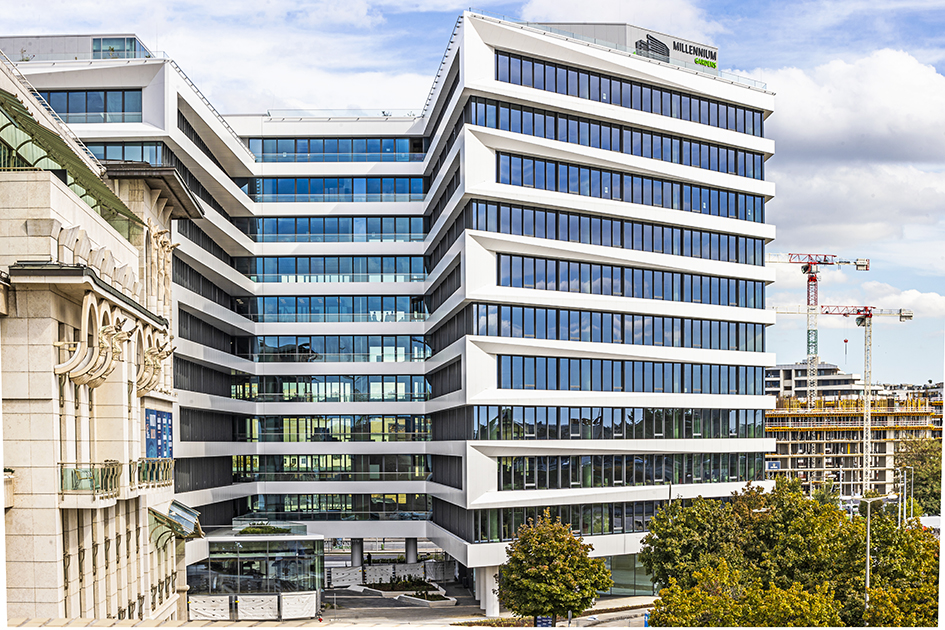Developments Still Ongoing in Some Sectors Despite the Challenging Market Environment

The RoseVille development by Atenor has 15,000 sqm of class “A” office space.
While there are substantial pipelines for the industrial and hotel markets in Hungary, things are more limited for offices, and there are none at all for shopping centers. Questions surround the structure of demand, the ability to source affordable finance, rising construction, energy and utility costs, permitting issues, the need to incorporate ESG features, and the likely availability of an exit through a sale.
These issues impact the different sectors in varying degrees and ways. All sectors are also facing the challenges of the broader economic environment and investor sentiment towards Hungary.
Asset owners in the office and, increasingly, industrial sectors need to provide more highly-specified, efficient and sustainable products with flexibility in the provision of space that will attract tenants and cater to staff needs in terms of amenities and locational and transportation issues.
Sustainability accreditation to the Breeam, Leed and Well systems are an essential requirement for a commercially successful asset in the office, industrial and hotel markets. Similarly, there is a need to adhere to increasingly stringent and comprehensive ESG regulations and EU Taxonomy.
New office projects are not being announced by the relatively small pool of international and local developers operating in Hungary, reflecting concerns over demand, the ability to conclude substantial preleases and the availability and cost of debt finance.
“The supply of new buildings is getting very slim as there has not been new construction starting in the past 12 months; only previously started constructions will be finished. Beyond that, there will be a dry period in terms of new building delivery,” comments Valter Kalaus, managing partner at Newmark VLK Hungary.
In contrast, the industrial and logistics sector boom continues unabated in the Greater Budapest area and, increasingly, in countryside hubs, although demand is said to be moderating.
Consultants have traced a substantial hotel pipeline in Budapest, although several projects are on hold with no definite completion dates. That said, confirmed hotel projects are being delivered with leading branded hotel operators on the back of tourism figures for Budapest that are fast approaching pre-pandemic levels.
Most Attractive Options
“Logistics and hospitality are currently the two most attractive development options. I believe Budapest is a very attractive touristic destination and still not that expensive, so our capital is very popular. For logistics, the central location and Hungary being the gateway for Europe is the key, I believe,” comments Zsolt Berényi, group development director at GTC Hungary.
Developers are having to produce ever more well-conceived and sustainable products in order to gain finance, let and sell a property.
“Big companies have an obligation to provide a CSRD [Corporate Sustainability Reporting Directive] report for 2024 for the first time; thus, there is knowledge on the measurement of the ESG parameters of the operations of their companies,” says Attila Madler, chief asset management office at CPI Hungary.
“However, they do not know about the ESG aspects of the real estate industry affecting the ESG targets of their companies; thus, they need to be educated by building developers/owners. We are in regular conversation with our tenants on ESG and energy topics and are happy to see that more and more often we receive inquiries from our tenants to share our ESG expertise with them,” he adds.
At the end of the development cycle, building owners need to adopt a longer-term sustainable strategy to access finance, achieve preleases and have the option of an exit strategy with a sale. Investor sentiment towards the market in Hungary demonstrates a cautious wait-and-see approach. This reflects the unstable geo-political environment and the resulting economic and financial uncertainty.
In this situation, many vendors and investors are exercising caution in anticipation of a more favorable political, economic and financial environment and, crucially, more predictable yields and pricing levels.
Investment Consensus
Concerning investment, the consensus no longer favors the once all-conquering office asset class, with most investors talking about the industrial and hotel markets.
“In my view, recent office deals show that, despite the limited interest for Hungary among investors and the general backlash against offices, transactions are possible for assets that tick all the boxes. We are not out of the woods yet,” comments Benjamin Perez-Ellischewitz, principal at Avison Young Hungary.
“I think the market has already processed a move out of yields by 100 basis points on the prime segment and 250-350 basis points on anything less core. In my view, there is still some de-compression coming before the market is stabilized, and, certainly, no yield compression on the horizon for 2024,” he explains.
“We will be around EUR 400 million for the year if we account for market arm’s length investment transactions. Bottlenecks remain the lack of debt and the difficulty to price the risk in this period of uncertainty and deteriorating fundamentals,” Perez-Ellischewitz adds.
In a recent investment deal, Hungary’s Erste Real Estate Fund has purchased the first phase of the 27,000 sqm H2Offices in the Váci Corridor from Skanska. The complex is Leed “Platinum” accredited, and Skanska also aims for Well accreditation for the complex.
“We are delighted that our long-term trusted relationship with Erste Real Estate Fund resulted in the successful transaction of the H2Offices project. Our partnership, based on common values and a strong commitment towards ESG, has been enriched by another building. This transaction stands as a testimony to the interest in high-quality and sustainable real estate products, indicating a positive shift in demand on the investment market,” says Katarzyna Zawodna-Bijoch, president & CEO of the Skanska commercial development business unit in CEE.
This article was first published in the Budapest Business Journal print issue of October 20, 2023.
SUPPORT THE BUDAPEST BUSINESS JOURNAL
Producing journalism that is worthy of the name is a costly business. For 27 years, the publishers, editors and reporters of the Budapest Business Journal have striven to bring you business news that works, information that you can trust, that is factual, accurate and presented without fear or favor.
Newspaper organizations across the globe have struggled to find a business model that allows them to continue to excel, without compromising their ability to perform. Most recently, some have experimented with the idea of involving their most important stakeholders, their readers.
We would like to offer that same opportunity to our readers. We would like to invite you to help us deliver the quality business journalism you require. Hit our Support the BBJ button and you can choose the how much and how often you send us your contributions.










